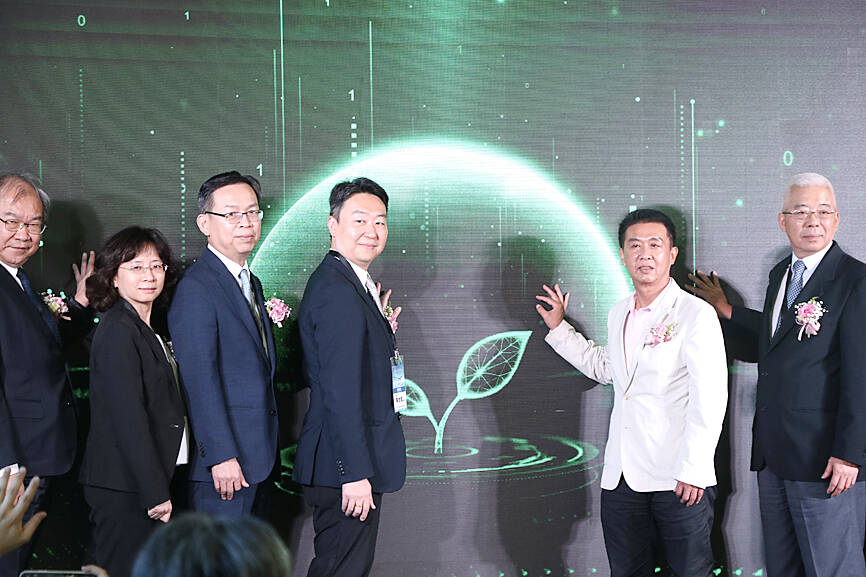Approximately 6,000 tonnes of sustainable aviation fuel (SAF) would be available for domestic and international airlines to use at airports across Taiwan this year, which would help curb about 15,000 tonnes of carbon emissions, the Ministry of Transportation and Communications said yesterday.
The use of SAF is part of government efforts to achieve net zero emissions by 2050.
The nation’s three largest airlines — China Airlines Ltd (中華航空), EVA Airways Corp (EVA, 長榮航空) and Starlux Airlines Co (星宇航空) — yesterday began using SAF in their aircraft, the first time domestic airlines used eco-friendly fuel in Taiwan.

Photo: Tsai Yun-jung, Taipei Times
CPC Corp, Taiwan (台灣中油) imported 400 tonnes of the SAF available for use this year, while Formosa Petrochemical Corp (台塑石化) produced 5,500 tonnes, the ministry said.
China Airlines and Starlux use the CPC-imported SAF, while EVA Airways uses the fuel produced by Formosa Petrochemical.
An inauguration ceremony, held the day after Earth Day, at Kaohsiung International Airport yesterday afternoon was attended by Minister of Transportation and Communications Chen Shih-kai (陳世凱), Democratic Progressive Party Legislator Hsu Chih-chieh (許智傑), Civil Aviation Administration Director-General Ho Shu-ping (何淑萍), China Airlines chairman Kao Shing-hwang (高星潢) and CPC chairman Fang Jeng-zen (方振仁).
At the event, SAF was pumped into a China Airlines aircraft and an EVA plane, while video showed SAF being used by EVA and Starlux aircraft at Taipei International Airport (Songshan airport) and Taiwan Taoyuan International Airport respectively.
The ceremony was held at the Kaohsiung airport because it obtained carbon footprint certification from Airport Council International in 2014, making it the nation’s first green airport, Ho said.
“Making SAF available at international airports is a global trend as international airlines seek to reduce carbon emissions in accordance with the regulations stipulated by the International Civil Aviation Organization,” she said.
“Like other countries, we are encouraging, rather than mandating, that Taiwanese airlines use SAF. Hopefully, by 2030, at least 5 percent of the total aviation fuel would be SAF,” she added.
CPC and Formosa Petrochemical secured certifications from the Carbon Offsetting and Reduction Scheme for International Aviation in December last year and Feb. 2 respectively.
CPC “will begin producing SAF next year,” Fang said. “The main problem is importing waste cooking oil from other countries, which we would resolve by working with the Ministry of Environment.”
Kao said the supply of SAF remains insufficient, adding that China Airlines would begin using it on flights heading to EU nations, which have begun implementing fuel regulations.
Using SAF would increase the airline’s fuel costs, but they would gradually decrease with the increase in supply, he said.
Asked whether the rise in fuel costs would also lead to increases in airfares, Kao said that ticket prices were mainly determined by supply and demand in the commercial aviation market.

CHAOS: Iranians took to the streets playing celebratory music after reports of Khamenei’s death on Saturday, while mourners also gathered in Tehran yesterday Iranian Supreme Leader Ayatollah Ali Khamenei was killed in a major attack on Iran launched by Israel and the US, throwing the future of the Islamic republic into doubt and raising the risk of regional instability. Iranian state television and the state-run IRNA news agency announced the 86-year-old’s death early yesterday. US President Donald Trump said it gave Iranians their “greatest chance” to “take back” their country. The announcements came after a joint US and Israeli aerial bombardment that targeted Iranian military and governmental sites. Trump said the “heavy and pinpoint bombing” would continue through the week or as long

TRUST: The KMT said it respected the US’ timing and considerations, and hoped it would continue to honor its commitments to helping Taiwan bolster its defenses and deterrence US President Donald Trump is delaying a multibillion-dollar arms sale to Taiwan to ensure his visit to Beijing is successful, a New York Times report said. The weapons sales package has stalled in the US Department of State, the report said, citing US officials it did not identify. The White House has told agencies not to push forward ahead of Trump’s meeting with Chinese President Xi Jinping (習近平), it said. The two last month held a phone call to discuss trade and geopolitical flashpoints ahead of the summit. Xi raised the Taiwan issue and urged the US to handle arms sales to

State-run CPC Corp, Taiwan (CPC, 台灣中油) yesterday said that it had confirmed on Saturday night with its liquefied natural gas (LNG) and crude oil suppliers that shipments are proceeding as scheduled and that domestic supplies remain unaffected. The CPC yesterday announced the gasoline and diesel prices will rise by NT$0.2 and NT$0.4 per liter, respectively, starting Monday, citing Middle East tensions and blizzards in the eastern United States. CPC also iterated it has been reducing the proportion of crude oil imports from the Middle East and diversifying its supply sources in the past few years in response to geopolitical risks, expanding

Pro-democracy media tycoon Jimmy Lai’s (黎智英) fraud conviction and prison sentence were yesterday overturned by a Hong Kong court, in a surprise legal decision that comes soon after Lai was jailed for 20 years on a separate national security charge. Judges Jeremy Poon (潘兆初), Anthea Pang (彭寶琴) and Derek Pang (彭偉昌) said in the judgement that they allowed the appeal from Lai, and another defendant in the case, to proceed, as a lower court judge had “erred.” “The Court of Appeal gave them leave to appeal against their conviction, allowed their appeals, quashed the convictions and set aside the sentences,” the judges